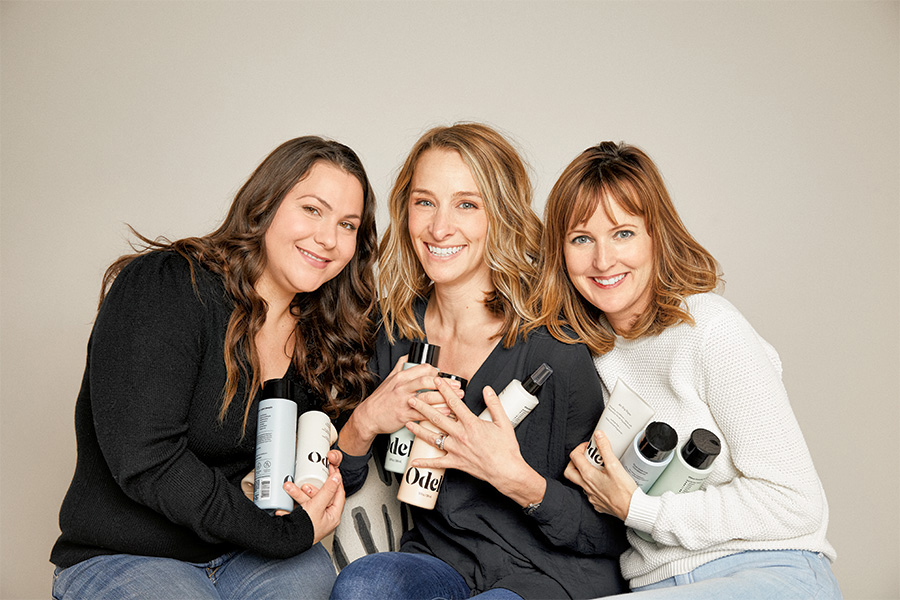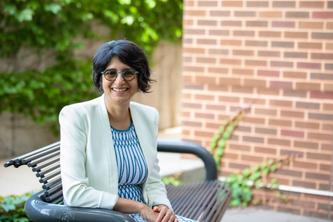
Startup culture seems to be encoded into some people’s DNA. So when Britta Chatterjee (’03 BSB, ’10 MBA) and Lindsay Holden (’10 MBA) met as students in the Carlson School of Management’s Brand Enterprise program, they immediately hit it off, bonding over dreams of starting a company together. And like all true entrepreneurs, they continued to feel the tug toward owning their dream even while building successful careers at large corporations.
Chatterjee eventually moved into the haircare and beauty industry, where she met another partner: Shannon Kearney. In 2019, the three women launched Odele Beauty, a line of clean, affordable, ungendered haircare products designed to be shared with everyone in a household. Their years of building their skills and knowledge were rewarded: Odele can now be found in Target stores nationwide.
Chatterjee, Holden, and Kearney started Odele because they wanted to build something that would meet their professional goals, personal needs, and the needs of their growing families.
Holden says she was never motivated by the linear corporate path and left her traditional 9-to-5 role because she wanted more time with her family.
“Reporting to ourselves gives us more flexibility,” says Holden. “Whether it’s working at night or over naptime, we can build our day to protect what is important.”
When Chatterjee started her career, she was dedicated to climbing the corporate ladder, but the birth of her first child shifted her focus to the entrepreneurial world.
“There can be events in a woman’s life that change her trajectory, but not a lot of people talk about it,” Chatterjee says. “You’re just supposed to say you’re fine. But for me, becoming a mom meant reevaluating my path.”

The increasing success of female-founded companies points to a narrowing gender gap in entrepreneurship. Mary Benner, chair and professor in the Strategic Management and Entrepreneurship Department at the Carlson School, has seen a lot of progress since she left the corporate workforce in the ’90s, but says there is still a long way to go.
“Women have more opportunities to take on leadership roles,” says Benner. “But they still face ingrained sexism and bias. Unintended, unconscious biases become an oppressive burden when they aren’t recognized and addressed.”
Benner believes diversity, equity, and inclusion in the classroom can make a difference. She seeks out case studies and examples of female CEOs and leaders with diverse backgrounds to share with her classes and strives to create an environment where everyone can participate.
Finding the right funders
Despite extensive haircare and retail experience and a presentation packed with detailed analysis and projections, Chatterjee, Holden, and Kearney say they felt like some investors questioned their certainty in their idea.
Bias can negatively impact the amount of funding women-led ventures receive. Female-founded companies raised just $6 billion in 2019, compared to $195 billion raised by male founders. And it’s not just the money: Women entrepreneurs miss out on the mentorship and accelerated growth that often come with access to early-stage funding.
“Success feeds success,” says Sandy Yu, assistant professor in the Strategic Management and Entrepreneurship Department, who is researching the impact of different types of financing on the growth and success of startups. “Once female entrepreneurs get their foot in the door and gain connections, they will continue to do well. Female founders who do get funding eventually tend to outperform their male counterparts.”
While many founders jump onto a path of growth for growth’s sake, Odele describes its goals with a dimension that goes beyond increasing revenue.
“Financial independence and success are motivators, but one of the reasons we started this company is to be there for our families,” Chatterjee says. We know our growth won’t be less because we are women. It will just be different. It will always include the holistic health and wellbeing of our team and their families.”
-------
See the original version of this story at the Carlson School.
- Categories:
- Business and Management





